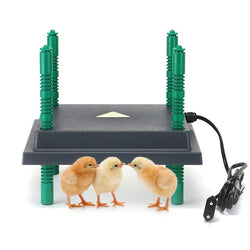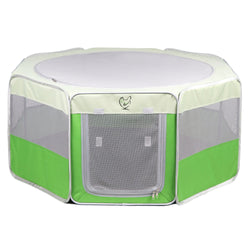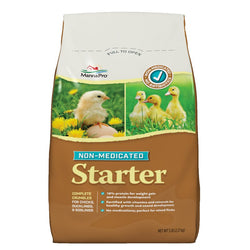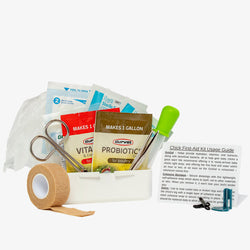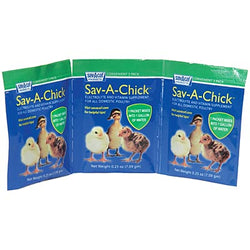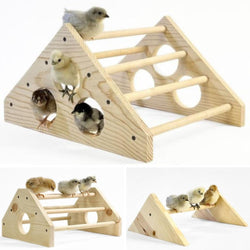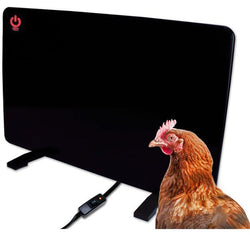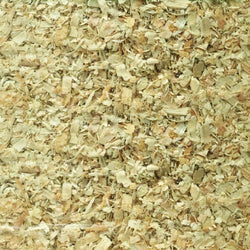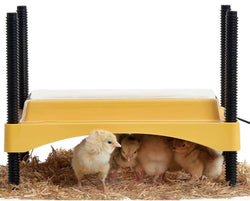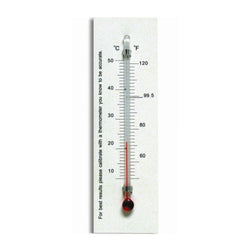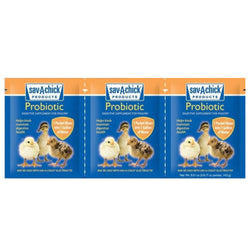All about Infectious Bursal Disease
Back to blog
It's always a good idea for chicks to have a lot of protein in their diet, right? Not necessarily! Infectious Bursal Disease is more prevalent in flocks that are fed high-protein (24%) feed. It can cause illness and death, especially in chicks that are are 3 - 6 weeks of age, so keep a close eye on your babies when they're that age! Keep reading to find out more:
Infectious Bursal Disease Also called
IBD, Gumboro
Prevalence
Common in large flocks
Signs
General signs -
Fluffed feathers, general lethargy, loss of appetite, illness/deaths usually at 3 - 6 weeks of age. This is the time period when the cloacal bursa are most active. Older birds that contact this disease are more likely to have been exposed to a highly virulent strain.
Cardinal or diagnostic signs -
The above general signs paired with the bird's picking of its own vent, difficulty pooping, loose droppings. Post-mortem findings show swollen or undeveloped bursa, flecks of blood in muscles, pale kidneys
Cause/s
Infectious bursal disease virus (IBDV), a birnavirus. This infects the chickens' "bursa of fabricus," which is an organ in the chicken's vent/cloaca that is necessary for developing good immune function.
Communicability
Yes. It is very contagious and is expelled in droppings and then picked up by other birds in the litter. It can become airborne in dusty litter. It survives for many months in the coop and is difficult to eliminate because it is carried by rodents and even insects in the litter like the darkling beetle. It can also be carried on shoes or equipment. It is more likely to occur in young birds, in highly productive laying breeds, in chicks fed a high amount of protein in the feed (24%), and in birds ill with other diseases such as coccidiosis or bronchitis.
Communicability to humans
No. Humans don't have a bursa of fabricus, and the virus doesn't have any known pathenogenicity for humans.
Incubation period
1 - 2 weeks
Latent
No. However, recovered chickens may have a suppressed immune response and can sometimes be more susceptible to other illnesses.
Endemic
Yes.
Home treatment and/or prevention
Prevention: Vaccination. Practice good biosecurity. Don't feed excessively high protein feeds. Keep the coop comfortable and well-ventilated.
Treatment: None. Mortality can be relatively low if the birds are well-cared for and have a comfortable coop with plenty of fresh air and clean water. Keep bottoms cleaned up to prevent birds from picking at their own vents, and prevent them from getting too chilled during the process.
Veterinary care
There is no treatment for the IBD virus. However, if your bird has another illness at the same time, such as coccidiosis, treatment for the other illness can help them recover more quickly, so veterinary consultation is always a good idea.
Recovery
In most cases, 70% survive. However, birds who have survived may not develop an appropriate immune response to other vaccinations, and may have suppressed immune systems in general.
Other conditions, illnesses and/or diseases with similar signs:
Coccidiosis, other conditions causing loose droppings and a dirty vent.
Infectious Bursal Disease Also called
IBD, Gumboro
Prevalence
Common in large flocks
Signs
General signs -
Fluffed feathers, general lethargy, loss of appetite, illness/deaths usually at 3 - 6 weeks of age. This is the time period when the cloacal bursa are most active. Older birds that contact this disease are more likely to have been exposed to a highly virulent strain.
Cardinal or diagnostic signs -
The above general signs paired with the bird's picking of its own vent, difficulty pooping, loose droppings. Post-mortem findings show swollen or undeveloped bursa, flecks of blood in muscles, pale kidneys
Cause/s
Infectious bursal disease virus (IBDV), a birnavirus. This infects the chickens' "bursa of fabricus," which is an organ in the chicken's vent/cloaca that is necessary for developing good immune function.
Communicability
Yes. It is very contagious and is expelled in droppings and then picked up by other birds in the litter. It can become airborne in dusty litter. It survives for many months in the coop and is difficult to eliminate because it is carried by rodents and even insects in the litter like the darkling beetle. It can also be carried on shoes or equipment. It is more likely to occur in young birds, in highly productive laying breeds, in chicks fed a high amount of protein in the feed (24%), and in birds ill with other diseases such as coccidiosis or bronchitis.
Communicability to humans
No. Humans don't have a bursa of fabricus, and the virus doesn't have any known pathenogenicity for humans.
Incubation period
1 - 2 weeks
Latent
No. However, recovered chickens may have a suppressed immune response and can sometimes be more susceptible to other illnesses.
Endemic
Yes.
Home treatment and/or prevention
Prevention: Vaccination. Practice good biosecurity. Don't feed excessively high protein feeds. Keep the coop comfortable and well-ventilated.
Treatment: None. Mortality can be relatively low if the birds are well-cared for and have a comfortable coop with plenty of fresh air and clean water. Keep bottoms cleaned up to prevent birds from picking at their own vents, and prevent them from getting too chilled during the process.
Veterinary care
There is no treatment for the IBD virus. However, if your bird has another illness at the same time, such as coccidiosis, treatment for the other illness can help them recover more quickly, so veterinary consultation is always a good idea.
Recovery
In most cases, 70% survive. However, birds who have survived may not develop an appropriate immune response to other vaccinations, and may have suppressed immune systems in general.
Other conditions, illnesses and/or diseases with similar signs:
Coccidiosis, other conditions causing loose droppings and a dirty vent.
